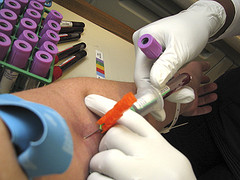It’s the moment of truth; you’ve taken a pregnancy test. The science behind the answer to one of life’s greatest miracles is really quite simple. Every pregnancy test is based on the identification of the human chorionic gonadotropin, or hCG.
This hormone is produced by pregnant women only, and is created by cells within the uterus. hCG signals the ovaries to manufacture estrogen and progesterone to help a fetus to grow. This hormone is detected by blood and urine pregnancy tests. As the pregnancy proceeds, the levels of hCG levels continue to rise. Therefore, they are easier to detect further into the term of the pregnancy.
A pregnancy test that’s based on a blood sample is performed by a doctor or other health professional in a clinic. This test detects pregnancy by gauging the hCG levels in the blood. Further, there are two types of blood tests to determine pregnancy: quantitative and qualitative blood tests.
The quantitative blood test determines pregnancy by measuring the exact amount of hCG in the bloodstream. Doctors can also use this test to determine how far along a woman is into her pregnancy.

flic.kr/p/71qkTu
A qualitative blood test, on the other hand, detects the presence of hCG in the bloodstream. While it can not measure the hCG levels in the blood, and can provide a definitive answer as to whether a woman is pregnant. This test does not give any sign as to how far along the woman is in her pregnancy.
Pregnancy tests using blood samples are conducted in the same manner of other blood tests.
* First, the woman’s arm is swabbed with alcohol.
* The medical practitioner inserts a needle into the woman’s arm and draws blood into a small vial.
* The blood sample is labeled and sent to a laboratory where the test will be performed.
Depending on the work load in the laboratory, it usually takes a day or two to receive the results of a pregnancy test.
Clinical blood tests have a 99 percent accuracy rate, and are able to detect pregnancy earlier than most urine tests. It is possible to be tested for pregnancy as early as seven days after ovulation. In other words, about one week before the next period is due.
It’s important to note that a positive blood test for pregnancy test may be false, if the woman is taking drugs containing hCG. These types of drugs are commonly used in fertility treatments. It is important to speak with a health care provider about any medications that can influence a pregnancy test result.
Tagged with: hCG • pregnancy test
Filed under: Pregnancy